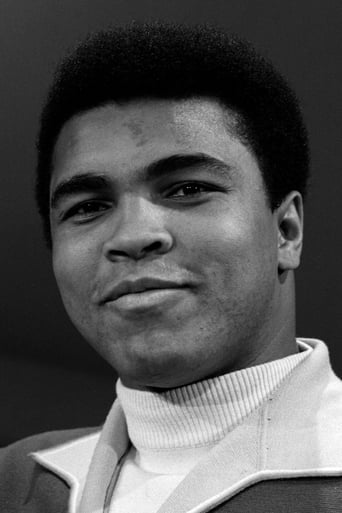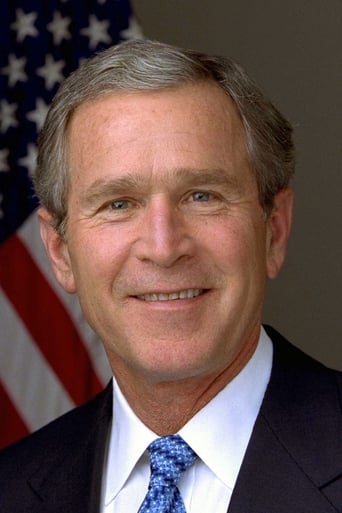FeistyUpper
If you don't like this, we can't be friends.
Chirphymium
It's entirely possible that sending the audience out feeling lousy was intentional
Usamah Harvey
The film's masterful storytelling did its job. The message was clear. No need to overdo.
michael_the_nermal
This film was pretty decent; it was made by the same guy who created the brilliant documentary on Enron, and the quality was evident. I understand that two hours is plenty of time for a documentary on a semi-famous writer best known for his books on the Hells Angels and his drug-fueled adventures in Las Vegas, but I didn't feel completely satisfied with this movie. The movie ought to have spent more time on Hunter Thompson's boyhood and youth. Why did he go into writing? When did he begin? Did his time in the Air Force influence his later career? There was no elucidation on Thompson's nascent work, such as the recently-published "Rum Diary." I had a feeling that much of Thompson's career as a writer stemmed from the experiences of his youth. Just how did he get that job at "The Nation", which led to his articles on the Hells Angels? This movie should have focused more on that, rather than the inordinate amount of time it spent on the 1972 election.The movie seemed like a paean to the man and his writing, but it provided balance by citing his destructive behavior and its toll on loved ones. The comments by Thompson's first wife were especially poignant, and her feelings about his suicide were the most mature and heart-felt of any in the documentary. It is from Thompsn's ex-wife that the viewer gets a relatively full picture of the man, for here was a woman who knew him as well as anyone, and could describe the good and bad of the man in all of its gritty detail.Some of the film seemed a bit creepy, but that's probably because it reflected off the weird vibes of Hunter Thompson and his followers. Johnny Depp has a wonderfully sonorous voice, perfect for reading excerpts of Thompson's work. It was really odd to see Depp get into his narration by holding a pistol up with his right hand while he read a leaflet from Thompson's ill-fated campaign for sheriff of Pitkin County, Colorado; on the front of the leaflet is Thompson's "gonzo" symbol. I guess Depp wants to play the part of the cool hipster in this scene by showing how down he is with the counterculture; but, lest we forget, he *was* in three rather lame CGI-laden Disney blockbusters as a not-too-funny, dopey, effeminate, so-called pirate. But I digress (which I love doing).This movie really didn't elucidate what exactly "gonzo journalism" is, other than the following: it involves heavy editorializing and the imposition of personal opinion on events, laced with sarcasm and tongue-in-cheek humor; including yourself in the story; searching for hope and morality in the most immoral of people and places; and, as a matter of course, getting stoned and zonked on hallucinogenic drugs and alcohol. (Ironic that most people know the word "Gonzo" as the name of the lovelorn blue weirdo Muppet from "Muppet Babies"; wonder how Thompson felt about that?)Confession: I've not read a thing by Thompson, but have heard of him and his reputation as a counterculture icon of sorts. Overall, the film was decent, and I might read some of Thompson's writing as a result of what I saw in this movie. I hope that's what that film will do for others as well.
ZombieFlanders
Opening with Hunter S. Thompson's written reactions to seeing 9/11 unfold on TV, Alex Gibney's Gonzo thrusts us into the idea of Hunter first as a journalist, a rebel, a successful writer, a political campaigner and finally a man, the product of all his excesses, who was loved and admired by many. In-between detailing the author's rebellion, out of control gun enthusiasm and drug use, we focus on only three major writings of his - his breakthrough novel; Hell's Angels, his most popular work, Fear & Loathing in Las Vegas and arguably his best work; Fear & Loathing on the Campaign Trail '72.Gibney gives us a cross section of interviewees, hearing mainly from his former wives and son, Juan Thompson, various ex-politicians including George McGovern and Jimmy Carter plus his Rolling Stone editor and contacts during his prolific 1970's period. Friends and peers are present too of course; Ralph Steadman, Tom Wolfe, Jimmy Buffet, but most notably Gibney avoids the trap of having an onslaught of celebrities reminisce about Hunter which helps to give the audience a more serious view of his importance to journalism and American politics, at the same time successfully evading or rehashing comments or ideas from Tom Thurman's 2006 documentary, Buy the Ticket, Take the Ride.It's put together with a professional pace, combining large amounts of archival footage and photos with narration by Johnny Depp, who reads from - and is sometimes shown reading, relevant passages from Hunter's writings. The biggest coup, however, is hearing various excerpt from Hunter's own tape recorder - showcasing unique "in the moment" time capsules with the writer whilst on his wild escapades of gonzo journalism.Ironically, the film's most clunky moment is when focusing on his most popular novel, F&L in Las Vegas. The director spends too much time showing clips from Terry Gilliam's film adaptation and not enough exploration via the interesting Depp reading device or Hunter's at the time comments - the segment certainly stamps the novels importance, but the overuse of movie footage broke up the tone a bit for me. It's a rare moment of ill judgment on Gibney's part, but the following sections on his political campaigning alongside George McGovern and his influence as a journalist on American politics during the late 60's, early 70's retain the best moments of the documentary alongside an earlier part which shows in detail Hunter's attempts to run for Sheriff of Aspen, Colorado. These are poignant moments and one where ex-wife, Sandi Hunter recalls it being Hunter's greatest moment, "having the passion to move people".As the film moves onto Hunter's suicide, the tone shifts and even though his son admits "that it was no secret" his father had planned to kill himself for many years, there's a difference between that and it actually happening. Above all, the emotion is still clear on some of the interviewees during this part, recorded not three years after the event. Appropriately, we are shown the construction of the "gonzo fist" tower Hunter had organized for his funeral and we're left with the feelings of if only he'd waited, or perhaps not killed the man over the myth. A man that Tom Wolfe describes as probably being "trapped in Gonzo".Though not definitive, Gonzo is definitely recommended for fans of Hunter Thompson, anyone with an interest in American politics or who just want to see what effect a true visionary can have on people and culture.4/5
RResende
I saw this inserted in a festival. Festivals are great occasions. There is a mood in the air, which invites us to see new things, ambitious ones. Most of the time, it must be said, i see failures, some glorious, others pure crap. But the possibility to see new surprise life altering creations compensates for all the eventually boring proofs we might have to endure. This little documentary is something of an exception in these types i described.As a film in itself it has little value. It's a collection of photographs, testimonies, old videos and testimonies made for the documentary, with a plus, Johnny Depp narrating Thompson. It is tailored like the serial documentaries the Discovery or History channel usually makes. But i actually enjoyed it. For one reason, i was ignorant about many of the aspects in his life, namely the politic involvements, which is a contradiction, among others, in the life of a counter-culture icon.Anyway, it's the very facts of Thompson's life that move the whole thing, and sparks the whole interest this may have. Because there was something that displeased me, a kind of formal contradiction which nevertheless is fun to find: H.Thompson was important as a writer, fundamentally because he broke forms, and in the process created a genre on its own. His kind of writing is essentially visual, which means it's also potentially cinematic - Gillian understood this, but in 'Fear and Loathing...' he was either to literal in his interpretation, or to attached to his own vision, so though he made a good piece, he was not fully faithful to Thompson. The visual quality of his writings can be tested in this documentary, whenever Depp reads. It's powerful, and probably more effective than any of the footage used. There lies the contradiction. The documentary is vulgar, it uses a worn out formula for serial documentaries, equivalents to the kind of dull journalistic writing Thompson wanted to evade. See my point?So, probably, Hunter will last for what he wrote, not for what he 'was'. After all, it's not uncommon or specially thrilling the kind of things he effectively did. Though that provided most of the juice and energy he puts in his writings, it's not the orgies, or the guns, or the acids that make his life worth knowing.Nevertheless, Thompson would perfectly incarnate the mood of a film festival. That's a complement.My opinion: 3/5 http://www.7eyes.wordpress.com
David Ferguson
Greetings again from the darkness. Another excellent documentary from Alex Gibney, who has also blessed us with "Taxi to the Dark Side" and "Enron: The Smartest Guys in the Room". Here, Gibney takes on the fascinating story of Hunter S. Thompson ... he of Gonzo Journalism.With enough material to support a mini-series, Gibney culls the material down to two hours and provides some insight, but mostly commentary on this uniquely talented writer and observationalist. The highlights include George McGovern heartfelt description of the man and interviews with Thompson's two wives, and "Rolling Stone" editor Jann Wenner. Through their own words and body language, we get a glimpse into the immense respect this man's talent generated. Of course, no punches are pulled on his weaknesses and transgressions.I couldn't help but chuckle of the irony as Tom Wolfe, resplendent as always in his tailored white suit, explains that Thompson created this character and its uniform/costume and felt the burden of living up to his legendary exploits. He was a captive of his own creation.While it is difficult to understand how someone with such self-destructive tendencies captured the respect of so many close to him, Thompson is truly an interesting and fascinating topic and was right in the middle of much of the history of the 60's and 70's. Quietly narrated by Thompson's friend, Johnny Depp, the film uses many topical songs selections to accompany moments in time.





